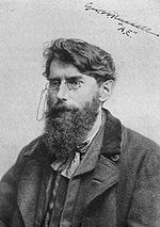
Æ
(sometimes written AE or A.E.), was an Irish
nationalist
, writer, editor, critic, poet
, and painter. He was also a mystical
writer, and centre of a group of followers of theosophy
in Dublin, for many years.
Russell was born in Lurgan
, County Armagh
. His family moved to Dublin when he was eleven.
A young man who had been troubling society with impalpable doctrines of a new civilization which he called "the Kingdom of Heaven" had been put out of the way; and I can imagine that believer in material power murmuring as he went homeward, "it will all blow over now." Yes. The wind from the Kingdom of Heaven has blown over the world, and shall blow for centuries yet.![]()
After the spiritual powers, there is no thing in the world more unconquerable than the spirit of nationality. ... The spirit of nationality in Ireland will persist even though the mightiest of material powers be its neighbor.![]()
In ancient shadows and twilightsWhere childhood had strayed,The world’s great sorrows were bornAnd its heroes were made.In the lost boyhood of JudasChrist was betrayed.![]()
Let thy young wanderer dream on:Call him not home.A door opens, a breath a voiceFrom the ancient room,Speaks to him now. Be it dark or brightHe is knit with his doom.![]()
We may fight against what is wrong, but if we allow ourselves to hate, that is to insure our spiritual defeat and our likeness to what we hate.![]()
Seek on earth what you have found in heaven.![]()
I remember once quarreling with William Butler Yeats|Yeats who was walking around the room with a sword in one hand muttering spells to ward off evil spirits, and I noticed that every time he passed a plate of plums he put down his unoccupied hand and took a plum and I said, 'Yeats, you cannot evoke great spirits and eat plums at the same time."![]()

